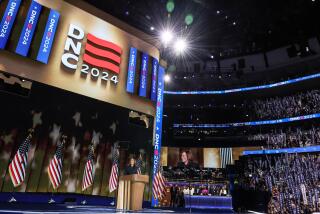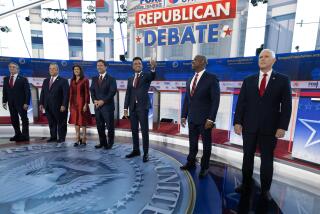Media Politics : GOP Lawmakers Stress Spirit of Cooperation : Focus Quickly Shifts to D-Word: Deficit
- Share via
Moments after the networks projected that George Bush would be the next President, politicians suddenly started using the D-word again Tuesday, as the deficit--missing during most of this campaign--resurfaced on television as the country’s most pressing problem.
And even leaders of Bush’s own party strove to minimize any talk of a conservative mandate and moved to undercut Bush’s most famous campaign promise: “Read My Lips, No New Taxes.”
“I’ve never gotten myself quite in that kind of box,” House Minority Leader Robert H. Michel (R-Ill.) said of Bush’s campaign pledge.
“I would hope the mandate is to deal with the deficit,” Senate Minority Leader Bob Dole (R-Kan.) said.
These Republican leaders may have been trying to do two things: By playing down talk of any mandate, they seemed to be extending the peace pipe to Democratic colleagues in Congress, with whom they know they now have to work in the wake of a campaign considered distinguished by its mean-spiritedness.
And they may have been trying to send the message to the new President-elect that he must smoke this pipe, too.
“We’re really going to have to do that in Congress in a very bipartisan way,” said Sen. Alan K. Simpson (R-Wyo.), “take the new President and say, ‘Here we are, we’re ready to help,’ and do it early before we get caught in a bunch of high old partisan games.”
Ailes Talks of Healing
No less a tough guy than Roger Ailes, the man behind George Bush’s hard-hitting TV commercials, was trying to make nice: “George Bush is the kind of person where he’ll reach out to everybody and try to heal whatever wounds might be there.”
Even before the polls had closed in California, CBS was conducting a panel with economists, who had read Bush’s lips and did not believe him.
“I think he’ll enhance revenues but he won’t call it a tax increase,” said Barbara Alexander, a managing partner from the brokerage firm Salomon Bros.
And many, including Michel and Democratic Rep. Dan Rostenkowski of Illinois, chairman of the House Ways and Means Committee, were urging that Bush move as quickly as possible to deal with the issue. The sooner he contradicts that campaign promise, the consensus went, the better.
“What worries me a little is how long it’s gonna take any President to make the 180-degree turn that’s necessary, to recognize he has to work with Congress,” Rostenkowski said.
The networks, meanwhile, once again raised criticisms of their conduct by calling the election before West Coast polls had closed. CBS projected the contest based on exit polls at 6:17, with an hour and 43 minutes of voting left. ABC followed three minutes later. NBC called it at 7:30.
Calls Projections ‘Unfair’
“I understand it when the networks want to report the news,” complained KABC-TV commentator Bruce Herschensohn a few minutes later, referring to the network that owns his station. “But this isn’t the news. They’re making the news . . . and then reporting the news that they made. I think that it’s terribly unfair to the Western states.”
Research, although inconclusive, fails to prove that early projections really depress voter turnout. And the networks will go so far only to not project a given state until the polls in that state close.
But they do appear sensitive about it. “Let me pause and say that is our CBS News estimate,” Dan Rather said, trying to have it both ways. “Our headline of the moment is that George Bush has been elected,” he said. “It does make a difference, those of you in states where polls haven’t closed, whether you vote.”
More to Read
Get the L.A. Times Politics newsletter
Deeply reported insights into legislation, politics and policy from Sacramento, Washington and beyond. In your inbox twice per week.
You may occasionally receive promotional content from the Los Angeles Times.











